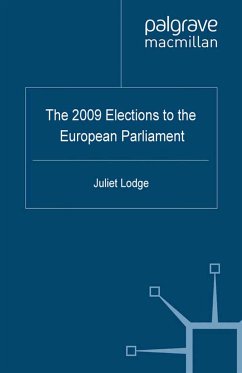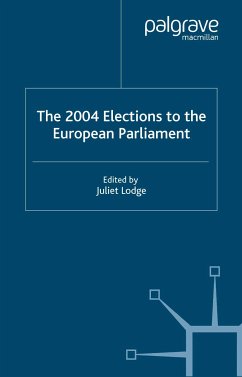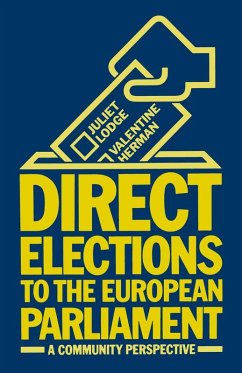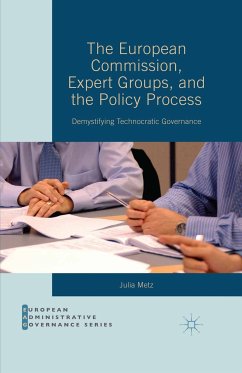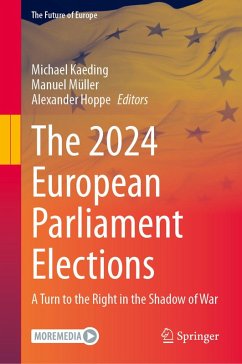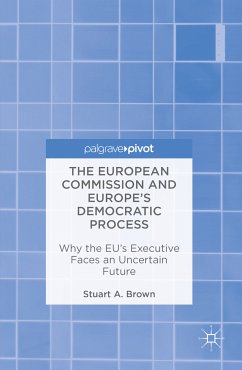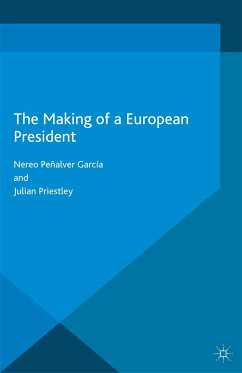
The Making of a European President (eBook, PDF)

PAYBACK Punkte
20 °P sammeln!






This book tells the inside story of Europe's first presidential campaign, the candidates, how they were chosen, the campaign trail, the TV debates and the tense negotiations which followed. It explains what led to this new way of choosing the Commission president and what it means for the future of the EU.
Dieser Download kann aus rechtlichen Gründen nur mit Rechnungsadresse in A, B, BG, CY, CZ, D, DK, EW, E, FIN, F, GR, HR, H, IRL, I, LT, L, LR, M, NL, PL, P, R, S, SLO, SK ausgeliefert werden.
Nereo Peñalver is a European Union official, currently working at the Foreign Affairs Committee of the European Parliament. Previously he served as adviser to European politicians such as Martin Schulz, President of the European Parliament, and Josep Borrell, former President of the European Parliament. He also worked for senior EU officials and at the EU delegation in Tunisia. He has Masters from the College of Europe in Bruges and from Pompeu Fabra University in Barcelona. Julian Priestley was Secretary General of the European Parliament from 1997 to 2007, and is a former Secretary General of the Socialist group at the EP. He studied at Balliol, Oxford and is a past President of the Oxford Union. He has written extensively on European and British politics. His books include, 'Six battles that shaped Europe's Parliament' (2008) and 'Europe's Parliament; People, Politics and Places', (with Stephen Clark) (2012). He was knighted in 2007. He was special adviser to Martin Schulz'presidential campaign in 2014.
Produktdetails
- Verlag: Palgrave Macmillan UK
- Seitenzahl: 218
- Erscheinungstermin: 30. April 2015
- Englisch
- ISBN-13: 9781137476746
- Artikelnr.: 43082423
"The authors possess a great feel for the minutiae of European politics and provide an excellent account of this important EU institutional development. Summing Up: Recommended. Upper-division undergraduate, graduate, and research collections." (P. Kurzer, Choice, Vol. 53 (6), February, 2016)
"Well worth your time to read" - Professor JHH Weiler, President of the European University Institute, Florence and inter alia Professor, NY Law School
"This book provides a unique insight into an unprecedented event: even after many decades in politics, this campaign made me fall in love with Europe all over again. It was a first in history: a battle for Europe, but fought with words, not weapons." Jean-Claude Juncker, President of
"Well worth your time to read" - Professor JHH Weiler, President of the European University Institute, Florence and inter alia Professor, NY Law School
"This book provides a unique insight into an unprecedented event: even after many decades in politics, this campaign made me fall in love with Europe all over again. It was a first in history: a battle for Europe, but fought with words, not weapons." Jean-Claude Juncker, President of
Mehr anzeigen
the European Commission
"This book by the Parliament's former Secretary General, Julian Priestley, and Nereo Peñalver is ambitious in its scope. It places the spitzenkandidaten process and the 2014 election campaign in a wider historical perspective; the changing role of the Presidency of the Commission, its greater democratic accountability to the European Parliament and the development of European political parties. It assesses what changes now in the balance of power between the EU institutions and what might happen next time around. They have spoken to all of those who played key roles, both in pushing the idea of a presidential campaign and in the elections themselves. And they tell the story of a profound change in the way the EU picks its leadership." Martin Schulz, President of the European Parliament
"Last June, the European Union had a constitutional coup that changed forever the political balance of power within it in favour of openness and democracy. No more will the EU presidency be a retirement bonus for failed or feeble prime ministers, but instead will be fought for across the EU by Euro pean parties promoting their political vision via a chosen standard bearer, all designed to win a majority in the Euro pean Parliament (EP) electoral college. How this came to pass and why it went virtually unnoticed is the subject of this succinct study." - Glynn Ford, Tribune
"This book by the Parliament's former Secretary General, Julian Priestley, and Nereo Peñalver is ambitious in its scope. It places the spitzenkandidaten process and the 2014 election campaign in a wider historical perspective; the changing role of the Presidency of the Commission, its greater democratic accountability to the European Parliament and the development of European political parties. It assesses what changes now in the balance of power between the EU institutions and what might happen next time around. They have spoken to all of those who played key roles, both in pushing the idea of a presidential campaign and in the elections themselves. And they tell the story of a profound change in the way the EU picks its leadership." Martin Schulz, President of the European Parliament
"Last June, the European Union had a constitutional coup that changed forever the political balance of power within it in favour of openness and democracy. No more will the EU presidency be a retirement bonus for failed or feeble prime ministers, but instead will be fought for across the EU by Euro pean parties promoting their political vision via a chosen standard bearer, all designed to win a majority in the Euro pean Parliament (EP) electoral college. How this came to pass and why it went virtually unnoticed is the subject of this succinct study." - Glynn Ford, Tribune
Schließen
Für dieses Produkt wurde noch keine Bewertung abgegeben. Wir würden uns sehr freuen, wenn du die erste Bewertung schreibst!
Eine Bewertung schreiben
Eine Bewertung schreiben
Andere Kunden interessierten sich für


